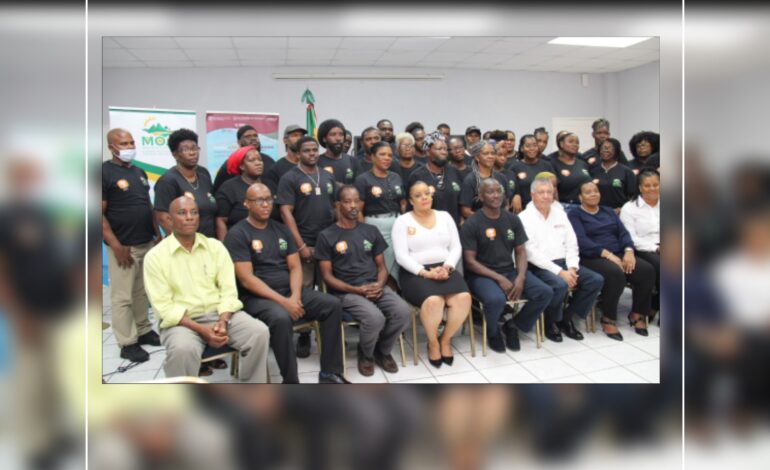
The Food and Agriculture Organization of the United Nations (FAO) and The Ministry of Agriculture in Saint Lucia, recently teamed up with the Government of Mexico to train (40) farmers in an Agri-Business Development Training. The training makes good on the Government of St Lucia’s agreement to ensure that the National School Feeding Program is linked with farmers and food producers who can sustainably provide safe produce. The month long training sessions explored topics such as low usage of agrochemical inputs, post-harvest handling, food safety, agribusiness management, and marketing linkages. It also afforded the participating farmers the opportunity to design agribusiness ideas, which were launched at last week’s graduation exercise.
The Training program is one of the many activities supported by the resilient school feeding sub-projectnent of the Mexico-CARICOM-FAO Initiative “Cooperation for Climate Change Adaptation and Resilience in the Caribbean”. It aimed at assisting a cadre of farmers to improve their capacity to supply fresh, safe and nutritious products to the National School Feeding program. Among the participants were farmers from three farmers’ organizations including, Helen’s Daughters, Black Farmers Cooperative, Belle Vue Farmers’ Co-operative and Farmers with Disabilities Group. Some of the areas covered in the training included access to and use of Low Agro-Chemical Input, Post-Harvest Handling, Food Safety and Quality, Agri-Business Management and Market Linkages.
The sub-project also includes support to update The Ministry of Agriculture’s Farmer Field School (FFS) Manual to integrate aspects associated with the National School Feeding Program, along with content related to climate-resilient, ecosystem-friendly agriculture, and its gender responsiveness in agricultural extensions and advisory services, to support schools’ gardens and training of farmers and their organizations was an integral part of the training.
Under the project, six school gardens which will be established at certain schools, will receive a farm management plan along with methodological tools, technological packages and training for the design and maintenance of their individual school gardens, while the students will receive training in basic garden maintenance. Six demonstration plots across six primary schools will also facilitate training in garden maintenance and to guide the school’s farm management plan, along with training to facilitate farmer trainings in Good Agricultural Practices (GAP), and climate resilient agriculture.
At the Farmers’ Graduation Ceremony, several high profile officials attended including, The Honorable Alfred Prospere, Minister of Agriculture, Fisheries, Food Security and Rural Development and Ambassador Luis Manuel Lopez Moreno, The Mexican Ambassador to Saint Lucia. Also in attendance were Barrymore Felicien, Permanent Secretary in the Ministry of Agriculture, Fisheries, Food Security and Rural Development and Soraya Niles–Regis, Deputy Permanent Secretary in The Ministry of Agriculture, Fisheries, Food Security and Rural Development.
In delivering official remarks, The Honorable Alfred Prospere, Minister of Agriculture, Fisheries, Food Security and Rural Development emphasized on the vision of the government to strengthen the national school feeding program. He stated, “For us at the Ministry of Agriculture, the School Feeding Programme in Saint Lucia is a pivotal undertaking in our attempts to reduce hunger and enhance food security locally, in line with the United Nations Sustainable Development goals (SDG’s) 2, 3 and 4 on the promotion of zero hunger, health and well-being and quality education respectively”.
On behalf of the government of Saint Lucia, Minister Prosper thanked FAO and the Government of Mexico for their support. In concluding, he stated, “What we have seen thus far, as a result of the successful implementation of the new model of the School Feeding Program in Saint Lucia, is increased school enrollment rates, a reduction in absenteeism, and an improvement in food security at the household level”.
The training modules include diagnosis and the foundation for a successful farm planning, assessing resources, farmer profile and creating an identity for the farm, followed by enterprise development, which will build on knowledge of crop selection, building farms through smart investments in equipment and infrastructure, hiring and managing workers effectively, regulations, and certification. During the third module, focus will be placed on developing competence in market development and engagement in practical exercises in creating marketing and farm plans, and identified strategies compatible with personal and financial goals, and that capitalize on customer needs and trends.
However, with the final module, emphasis placed on financial management, tracking production costs and pricing, establishing procedures for record keeping and accounting; production activities using with minimal pesticide use, Good Agricultural Practices, Post-Harvest Management, other Farmer Field School crop production activities, and risk management during the final module.
Ambassador Luis Monero, Mexican Ambassador to Saint Lucia stated, “We will continue to support the development of School Feeding Program. We are extremely happy for the collaboration and the progress we are seeing”.
Meanwhile, Anthia Joshua, a retired Marketing Specialist with the Ministry of Agriculture and trainer with the program said, “We had a mixed group of farmers attending the training our youngest participant was 16 years old and the eldest was 60 years. We had a diverse group including youth, Agri Entrepreneurs, farmers with disabilities and Farmers’ Cooperatives. Our mission was to involve as many farmer groups as possible”.
One of the participating farmers, Anthony Herman recognized that the training experience was fruitful. He further expressed, “I wish we could have continuous training throughout the year on the new technologies and farming practices. I am very excited especially about the Business Training. I am ready to undertake the changes”.
Meanwhile, Cherry Anne Smith, the National Project Personnel with FAO offered thanks to the partners and facilitators. She said, “Thank you to all of you who have been collaborating with us thus far. Special thanks to the Ministry of Agriculture and our counterparts Thaddeus Constantine and Barrymore Felicien and thank you farmers for your dedication thus far and the commitment shown over the past month. Let us continue working together. Well done farmers”.






